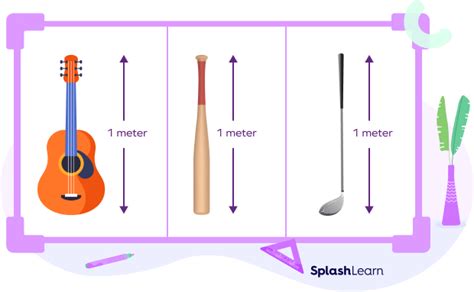The length of 1 meter is a fundamental unit of measurement in the International System of Units (SI), and it is defined as the distance traveled by light in a vacuum in 1/299,792,458 of a second. This definition was adopted in 1983 by the 17th General Conference on Weights and Measures, and it has since become the standard reference point for measuring length in many fields, including physics, engineering, and everyday applications.
Understanding the Meter

To put the length of 1 meter into perspective, it is equivalent to 100 centimeters (cm) or 1,000 millimeters (mm). In the imperial system of units, 1 meter is approximately equal to 3.2808 feet or 39.3701 inches. The meter is also a key component of other units of measurement, such as the square meter (m²) for area and the cubic meter (m³) for volume.
Practical Applications of the Meter
In everyday life, the meter is used to measure a wide range of lengths, from the distance between two points on a map to the length of a room or the height of a person. It is also an essential unit of measurement in many industries, including construction, manufacturing, and transportation. For example, the length of a car is typically measured in meters, as is the height of a building or the width of a road.
| Unit of Measurement | Equivalent Value |
|---|---|
| 1 meter | 100 centimeters (cm) |
| 1 meter | 1,000 millimeters (mm) |
| 1 meter | 3.2808 feet (approximately) |
| 1 meter | 39.3701 inches (approximately) |

Key Points
- The length of 1 meter is defined as the distance traveled by light in a vacuum in 1/299,792,458 of a second.
- 1 meter is equivalent to 100 centimeters (cm) or 1,000 millimeters (mm).
- The meter is a fundamental unit of measurement in the International System of Units (SI) and is widely used in many fields.
- The definition of the meter has undergone several revisions, with the current definition providing a highly stable and reproducible reference point for measuring length.
- The meter is an essential unit of measurement in many industries, including construction, manufacturing, and transportation.
In conclusion, the length of 1 meter is a well-defined and widely accepted unit of measurement that plays a crucial role in many aspects of our lives. Its definition, based on the speed of light, provides a highly stable and reproducible reference point for measuring length, and its equivalent values in other units of measurement make it a versatile and useful tool in a wide range of applications.
What is the definition of 1 meter?
+1 meter is defined as the distance traveled by light in a vacuum in 1⁄299,792,458 of a second.
How is 1 meter related to other units of measurement?
+1 meter is equivalent to 100 centimeters (cm) or 1,000 millimeters (mm), and it is approximately equal to 3.2808 feet or 39.3701 inches.
Why is the meter an important unit of measurement?
+The meter is a fundamental unit of measurement in the International System of Units (SI) and is widely used in many fields, including physics, engineering, and everyday applications. Its definition provides a highly stable and reproducible reference point for measuring length.
